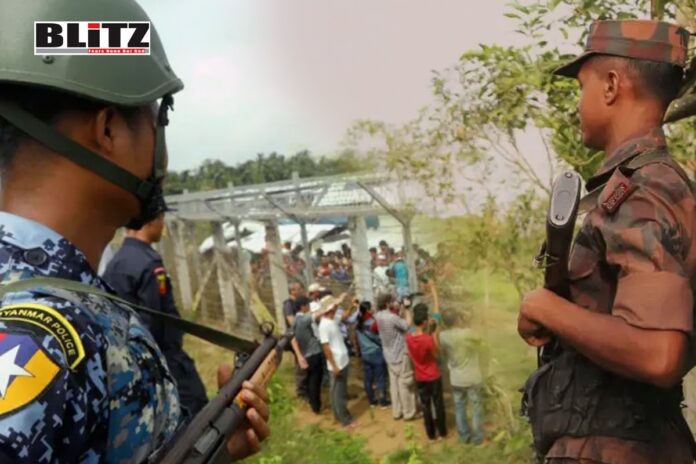As tensions escalate at the Bangladesh-Myanmar border, concerns are growing over Myanmar’s alleged attempt to push an additional half-a-million Rohingyas into Bangladesh. The already complex security situation in Bangladesh, compounded by the conflict between the Myanmar army and rebels, has prompted analysts to call for advanced measures to address the impending troubles.
According to media reports, the Arakan Army rebels, engaged in heavy fighting in Myanmar’s Rakhine State, may seek refuge in Bangladesh if they fail to achieve their objectives. Additionally, fears loom over the displacement of another half-million Rohingyas into Bangladesh under the guise of the ongoing conflict. Security analysts are advising Bangladesh Border Guard (BGB) and the Coast Guard to proactively plan for and respond to the potential challenges that may arise.
Heavy fighting is going on in Myanmar between rebels and the army for control of various states including Shan, Kachin and Rakhine. The Arakan Army is active in Rakhine State.
Myanmar junta has suffered a series of battlefield defeats in a sweeping offensive by rebel groups that started in October, dubbed Operation 1027. So far, the army has lost control of at least 35 towns, according to the media collective Myanmar Peace Monitor, although a Beijing-mediated ceasefire has halted clashes near the Chinese border. In other parts, fighting continues.
The instability in the Bangladesh border region has been exacerbated by the ongoing clashes between the Myanmar army and Arakan separatists for over a week. Reports indicate that Myanmar’s junta is plotting to forcibly relocate more than 400,000 Rohingyas into Bangladesh, using the pretext of the ongoing battle. Rohingyas have reportedly been gathered in bordering areas from the Mangdu-Buchidong region, awaiting potential relocation.
HM Lutful Lahil Majid, station commander of Teknaf Coast Guard, said there is a lot of tension on the border. The situation can change at any time. “We also have reports of new infiltration by Rohingyas. We are keeping watch from all sides to ensure that Bangladesh does not become a victim of the situation. We won’t compromise on security,” he said.
With the Arakan Army gaining the upper hand in the conflict, security analysts are wary of potential spillover into Bangladesh. Beyond the immediate concern of Rohingya infiltration, there is apprehension that Bangladesh might have to contend with the Arakan Army’s presence on its soil. Emdadul Islam, a former diplomat of the Bangladesh Embassy in Myanmar, underscored the possibility of an unavoidable conflict, urging Bangladesh to be fully prepared. “Incidents like Rohingya infiltration may happen again. Bangladesh has no option other than bolstering surveillance,” Islam cautioned.
Bangladesh currently hosts over 1.2 million Rohingyas, most of whom fled Myanmar following a brutal military offensive targeting the predominantly Muslim ethnic minority in August 2017. The burden on Bangladesh’s resources and infrastructure due to the refugee crisis adds a layer of complexity to the current situation. As the nation grapples with the impending challenges at the border, it becomes imperative to explore potential strategies and diplomatic avenues to address the multifaceted security concerns.
The international community’s role in mediating the conflict and finding a sustainable solution is crucial. Diplomatic efforts should focus on urging Myanmar to address the root causes of the conflict, ensuring the safe return of displaced Rohingyas, and fostering stability in the region. The United Nations and neighboring countries must collaborate to prevent further escalation and protect the rights and well-being of vulnerable populations caught in the crossfire.
As the escalating tensions at the Bangladesh-Myanmar border demand a comprehensive and proactive approach to address the security challenges. Bangladesh must strengthen its border surveillance, collaborate with international partners, and be prepared to manage potential conflicts arising from the spillover of Myanmar’s internal strife. The plight of the Rohingyas underscores the urgency of finding lasting solutions to the root causes of the conflict, promoting peace, and protecting the rights of those affected by the ongoing crisis.




